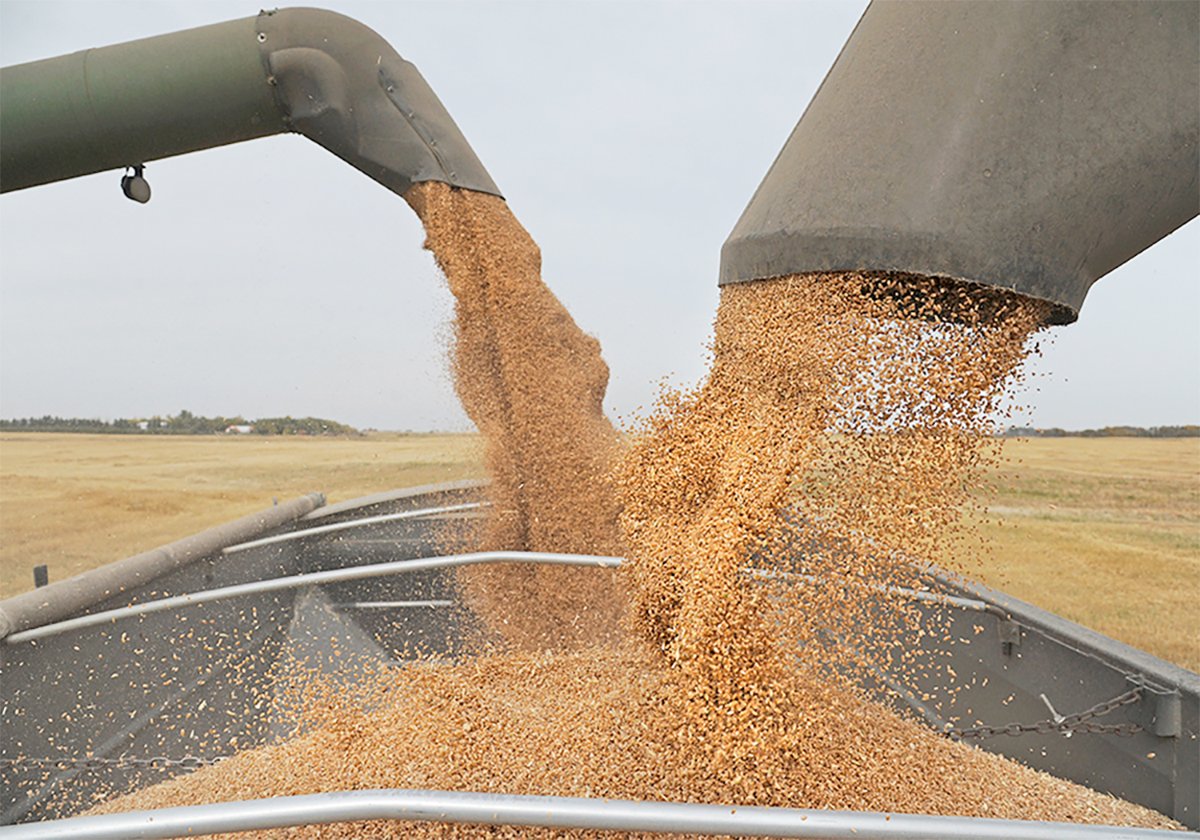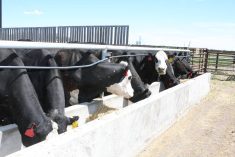Barley tyranny
To the Editor:
On Nov. 30 a group of 40-plus pro-Canadian Wheat Board supporters who are barley growers attended the Alberta Barley Commission convention in Red Deer. It became quite apparent as the morning proceeded that there was no winning the day and that democracy in the Alberta Barley Commission was seriously flawed.
The ABC chairman, Tim Harvie, was asked if the ABC’s mailing list was used to mail out literature for other organizations opposed to the CWB during the Alberta grain marketing plebiscite. The ABC chairman denied that other organizations had used the list. However, it is interesting to note the ABC general manager, Clifton Foster, admitted that ABC had made general mailings for other commodity organizations.
Read Also

Agriculture productivity can be increased with little or no cost
There’s a way to enhance agricultural productivity with little or no cost. It doesn’t even require a bunch of legislative changes.
During the debate on a resolution proposed by the pro-CWB group calling for more money to be spent on research instead of political activities, it became even more evident that the ABC chairman, Mr. Harvie, had no sense of fair play as he made comments that could have influenced the vote.
His knowledge of parliamentary procedure was very obvious in its absence as he never once asked me as the seconder of the motion if I wanted to speak to the motion.
After allowing a number of his friends to speak in opposition to the motion, he arbitrarily closed debate without inviting mover Art Macklin to respond to the opposition.
I point this out to producers because I am sure that most of us hold the right of freedom of speech and the right of having a properly run democracy dear to our hearts. The tyranny imposed on us by such would-be leaders as Mr. Harvie is breaking down these ideals.
It is really regrettable that he and his friends are using the power that they get from a checkoff that was meant for doing positive things for the growing of barley to promote their own political agenda.
It is our opinion that the interests of farmers would be better served by checkoff money going to support the Western Grains Research Foundation which is non-political. WGRF put 90 percent of their fund to research.
– Roger C. Buxton,
Consort, Alta.
CTF policy
To the Editor:
I am writing to correct a letter from T. A. Madison (Open Forum, Nov. 23), which claims that the Canadian Taxpayers Federation “has been infiltrated by a small self-interest group” and that we are involved in a court challenge against the Canadian Wheat Board.
These statements are completely inaccurate. The CTF continues to represent all of its 85,000 supporters across Canada in fighting government waste and high taxes at the federal and provincial levels. As part of that ongoing mandate, we believe that all government agencies, including the CWB, should operate with maximum efficiency and accountability, and should respect the rule of law.
The CTF has never called for the elimination of the Wheat Board, and we believe that its continued role as a marketer of grains should be decided by the farming community.
– Jason Kenney,
president, CTF,
Edmonton, Alta.
Flour mills
To the Editor:
I am writing to respond to a letter written by B. Leitgeb (Open Forum, Nov. 16). Ms. Leitgeb argues that Canadian Wheat Board policies have deterred a group of farmers from developing a flour mill in Manitoba. I disagree and would like to set the record straight.
Representatives of this group met with the CWB on a number of occasions. The CWB told them their proposed mill would be large enough to compete with other commercial mills in Western Canada. Therefore, it would be subject to the same pricing policy as those mills.
This policy assures North American competitive prices.
The CWB explained that the group would have competitive advantages over commercial mills. This group of farmers would be able to sell their grain directly through a buyback procedure. This would enable the group to retain all of the handling, elevation and administration charges for their members.
In addition, the group could use cash advances to cover the cost of stocks for the mill. The group would be free to acquire stocks of grain from the U.S. for milling if they chose to do so.
Other advantages include the ability to mill a specific variety of grain, provide off-site grain storage and provide a non-technical labor pool.
The CWB also explained the various options for locking in a basis, or a price, over periods of time in order to suit the operations of their mill.
Ms. Leitgeb suggests these farmers would have to pay freight on their grain. That is not true. A freight deduction from the milling wheat price is made to compensate for the fact that sales to Prairie processors do not generate as high a return to the pool account as sales made at an export port.
Grain of equal quality is worth a different amount depending on where it is made available for sale. They do not pay an extra freight charge.
Finally, the CWB made clear the domestic milling industry is among the CWB’s largest and most valued customer. The domestic industry, at 2.2 million tonnes per year, is roughly twice as large as the U.S. market for Canadian milling wheat.
The CWB is supportive of value-added initiatives. The success of the flour milling and barley malting industries in Western Canada demonstrate this commitment.
If the CWB provided lower-priced grain to this group, all farmers would pay the cost. Other Canadian mills would quickly demand the same right to buy wheat at the lowest price possible. Selling grain at the lowest price is not a principle which the CWB supports.
– Earl Geddes,
program manager,
CWB Sales and Market
Development Division,
Winnipeg, Man.
Bible lessons
To the Editor:
Re “Frenzy Grips Alberta” by Terry Fries (Nov. 23): Fries talks about “Alberta Bible Belt evangelical ranting, trying to get rid of farm subsidies and abortion funding.”
I wonder if Mr. Fries even knows what the Bible teaches. It certainly does not teach to rant and rave about your neighbors. But to love God and neighbor, to uphold life as sacred, and freedom for the individual, but also to be responsible for its own actions. The Bible certainly does not teach to have wasteful subsidies that “rob Peter to pay Paul,” and to establish a non-productive bureaucracy. But perhaps Mr. Fries would be interested to take over Alberta’s role in providing funds for transfer payments for Canada’s poor.
– Hans Visser,
Taber, Alta.
Shoo, coyotes
To the Editor:
The government of our as yet great nation continues to astound me with its illogicities.
Recently one of my heifer calves was killed by coyotes in the night when the animal was sleeping only 100 yards from the barnyard.
Ranchers like myself are not allowed to hunt for these predators at night and we are no longer allowed to poison them. These regulations make the coyote’s job easier and the rancher’s job less profitable because coyotes hunt at night and are difficult to catch in the daytime.
As a result the government compensated ranchers for livestock lost to predatory animals. Recently, however, the government abandoned this program. I have no problem with this except that the rules and regulations that inhibit the ability of the rancher to protect his livestock are still in place.
If I am not allowed to protect my livelihood and the government will not compensate me because of their rules, what am I supposed to do? Am I to stand out there all night and cry, “Shoo, coyotes, go on, get”? I have work to do all day too.
If I could drastically thin them out by poison or if I catch them at night it would help, but I can’t chase them around the back forty all night and spend all day trying to get close enough to shoot them. Therefore, this policy is illogical.
It sounds like a similar policy to that which allows child molesters and rapists out on the street without treatment, but does not allow the citizenry firearms for protection.
It’s the same logic that says grain must be sold through the east or west coast at the price the CWB offers but makes you pay high freight costs to get it there.
It’s the same logic that says provinces must provide certain health services but refuses to name which ones and then penalizes them for cutting some. … I’m tired of the ridiculous policies of this government.
– Douglas Griffiths,
Coronation, Alta.
Organic meeting
To the Editor:
The Back to The Farm Research Foundation is sponsoring one-day workshops for certified organic farmers and gardeners and anyone who is interested in moving into organic production. The purpose of the meetings will be to study the possibility of establishing a grassroots farm policy organization of certified organic producers.
The next meeting will be held in Davidson in early January. … Several events have come to light recently that will be bringing about rapid positive changes in agriculture, and we believe organic farmers must be in a position to provide leadership in developing meaningful policies to meet their own needs, the needs of the many conventional farmers who will move to organic farming and our customers at home and abroad.
Following are a number of facts that have recently come to light that we believe will force rapid change. Chemical agriculture is obsolete. About the middle of this past summer, a brochure appeared without any publicity or fanfare among the many bulletins in Rural Service Centres on chemical agriculture. It is entitled “Resistance of Weeds to Herbicides.”
It was published by the Saskatchewan, Alberta and Manitoba Departments of Agriculture. The publication was financed by Cyanamid Canada Inc. and Farmline. Referring to “herbicide resistance” it says: “When herbicides fail due to development of (plant) resistance, they will fail in subsequent years, regardless of weather or application procedures.”
It goes on to say: “Rotating herbicides is only a first-aid measure in preventing this problem. Long-term management means shifting your cropping system toward integrated approaches to weed control.”
Many farmers in this district have sprayed the same weeds several times this season with very poor results.
The chemical companies, instead of having one broad-spectrum herbicide, have developed a great many for every kind of a weed infestation possible. The results have been very expensive and not very effective. Chemical farmers are beginning to realize that chemical farming is obsolete. …
Reports are coming from every direction that many germs or disease-causing bacteria are resistant to antibiotics. Broad-spectrum antibiotics are causing germs to mutate and develop new germs that are antibiotic resistant. Present livestock and poultry methods of production relying on antibiotics in practical terms are obsolete. …
– Elmer Laird, President,
Back to the Farm
Research Foundation,
Davidson, Sask.














